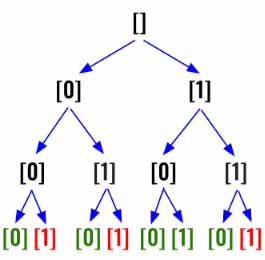Backtracking - Find Unique Binary String
All diagrams presented herein are original creations, meticulously designed to enhance comprehension and recall. Crafting these aids required considerable effort, and I kindly request attribution if this content is reused elsewhere.
Difficulty : Easy
DFS, Backtracking
Problem
Given an array of strings nums containing n unique binary strings each of length n, return a binary string of length n that does not appear in nums. If there are multiple answers, you may return any of them.
Example 1:
1
2
3
Input: nums = ["01","10"]
Output: "11"
Explanation: "11" does not appear in nums. "00" would also be correct.
Example 2:
1
2
3
Input: nums = ["00","01"]
Output: "11"
Explanation: "11" does not appear in nums. "10" would also be correct.
Example 3:
1
2
3
Input: nums = ["111","011","001"]
Output: "101"
Explanation: "101" does not appear in nums. "000", "010", "100", and "110" would also be correct.
Solution
This is bit different, but definitely not a complicated problem. We need to basically find all the binary numbers of length n and if we find any of that does not belong to the input array then return the one does not belong.
Here we shall try to first solve to find all the combinations up to length n. Please refer my other problems if you are unable to understand the below solution. We are using template 2 here.
1
2
3
4
5
6
7
8
9
10
11
12
13
14
def find_binary(n):
output =[]
def dfs(k,path):
if k==n:
output.append(''.join(path))
return
for c in ['0','1']:
path.append(c)
dfs(k+1,path)
path.pop()
dfs(0,[])
return output
1
2
3
4
print(find_binary(2))
['00', '01', '10', '11']
print(find_binary(3))
['000', '001', '010', '011', '100', '101', '110', '111']
Now the only thing we have do is to modify the above and return a missing binary number. Let’s first create a map using the input nums.
1
binary_map = {s for s in nums}
Inside the dfs() we need to validate if the path is present in the binary_map, if not then return it, otherwise return None
1
2
3
if k==n:
found = ''.join(path)
return None if found in binary_map else found
Finally, inside the for loop if we get a response which is not None we return that.
1
2
3
4
5
6
for c in ['0','1']:
path.append(c)
found= dfs(k+1,path)
if found is not None:
return found
path.pop()
At the end, return the dfs() function.
1
return dfs(0,[])
Final Code
Here is the full code.
1
2
3
4
5
6
7
8
9
10
11
12
13
14
15
16
17
def find_binary(nums):
n = len(nums)
binary_map = {s for s in nums}
def dfs(k, path):
if k == n:
found = ''.join(path)
return None if found in binary_map else found
for c in ['0', '1']:
path.append(c)
found = dfs(k+1, path)
if found is not None:
return found
path.pop()
return dfs(0, [])
